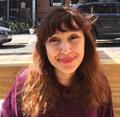
Elif Karakaya
Doctorant.e
DoctoranteInstitution de rattachement principal :Diplômée d’une licence et un master de philosophie à Bogazici University (Istanbul), Elif Karakaya a obtenu un master en Études visuelles et culturelles à University of Rochester (New York). Actuellement doctorante dans le même programme et étudiante invitée au Cetobac, EHESS, elle travaille sur sa thèse intitulée L’empire non-fini : lieu et mémoire dans l'art visuel et la culture post-ottomans. Son projet examine la mémoire des anciennes villes ottomanes dans l'art visuel et la culture contemporaine en se concentrant sur les œuvres d'immigrants de deuxième et troisième génération dont les familles ont été déplacées à la fin de l'empire. En comparant les cas d’artistes arabes, grecs et arméniens, il vise à articuler les formes d’appartenance trans- et supranationales qui ont persisté parmi les descendants des citoyens ottomans malgré la redistribution nationaliste de l’ancienne géographie de l’empire. À travers une étude de divers médias tels que la photographie, les livres d'artistes, les installations, les vidéos et les expositions, il compare également différents régimes visuels dans lesquels d'anciens lieux ottomans sont représentés et commémorés.
Having completed a bachelor’s and master’s degree in philosophy at Bogazici University, Istanbul, Elif Karakaya received a master’s degree in Visual and Cultural Studies at University of Rochester, New York. Currently a PhD candidate in the same program and a visiting student at Cetobac, EHESS, she works on her dissertation titled Unfinished Empire: Place and Memory in Post-Ottoman Visual Art and Culture. Her project examines the memory of former Ottoman towns in contemporary visual art and culture by focusing on the works of second- and third-generation immigrants whose families were displaced at the end of the empire. By comparing the cases of Arab, Greek, and Armenian artists, it aims to articulate the trans- and supranational forms of belonging that persisted among the descendants of the Ottoman citizens despite the nationalist redistribution of the empire’s former geography. Through a study of various media such as photography, artists' books, installations, videos, and exhibitions, it also compares different visual regimes in which former Ottoman places are represented and commemorated.
Intérêts scientifiques / scientific interests
- Immigration et diaspora / migration and diaspora
- Culture visuelle post-ottomane / post-ottoman visual culture
- Transmission intergenerational de la memoire / intergenerational transmission of memory
- Intervention artistique dans l’archive et historiographie / artistic intervention in archives and historiography
Champs / Fields
- L’art contemporain méditerranéen / contemporary Mediterranean art
- Histoire globale de l’art / global art history
Publications / Publications
- “Beyond Transparency: Walid Raad’s Preface to the Third Edition,” Espace art actuel, no. 129 (Fall, 2021),18-29.
- “The Weight of the Posthumous: A review of Etel Adnan ‘Light’s New measure’,” Invisible Culture (2021)
Projets collectifs / Collective projects
- Membre du collectif On Film (Rochester, New York) qui organise des projections des films en format 16 mm et 35 mm (2021-2023) / member of the collective On Film that programs film screenings in 16 mm and 35 mm formats
- Assistante des expositions de l’art contemporain à Hartnett Gallery (Rochester, New York) (2021-22)/ assistant of contemporary art exhibitions at Hartnett Gallery (Rochester, New York) (2021-22)
Autres activités scientifiques / Other scientific activities
- Membre du comité de rédaction InVisible Culture: A Journal for Visual Culture, Rochester, New York / editorial board member at InVisible Culture: A Journal for Visual Culture, Rochester, New York
- Traduction (francais-turc) / translation (French-Turkish):
o Jacques Rancière, Béla Tarr: Ertesi Zaman (Béla Tarr: Le temps d’après) (Istanbul: Éditions Lemis, 2016)
o Georges Didi-Huberman, Kabuklar (Écorces) (Istanbul: Éditions Lemis, 2018)
o Jacques Rancière, Kelimelerin Mekanı: Mallarmé’den Broodthaers’a (L’espace des mots: de Mallarmé à Broodthaers) (Istanbul: Éditions Lemis, 2020)